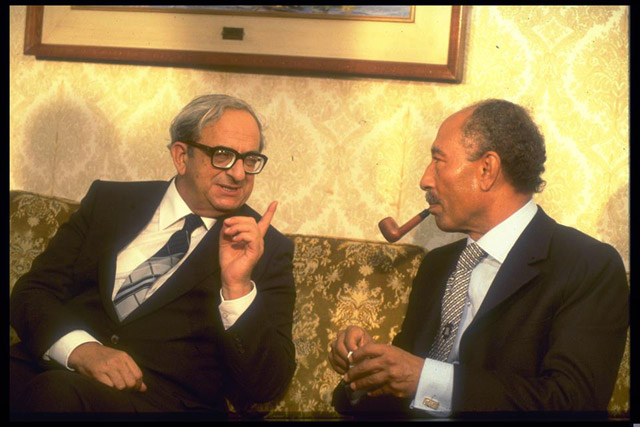The State of Israel has today lost a beloved son, a president of the people, one who never saw himself above the people, but to whom we all looked up in love and admiration.
Yitzhak Navon, who served as the 5th President of the State of Israel, from 1978 to 1983, passed away on Saturday, November 7, 2015 at the age of 94. He will be laid to rest on Mt. Herzl in Jerusalem.
During his Presidency, he strove to act as a bridge between Israel's ethnic groups, religious and secular, Sephardim and Ashkenazim, left and right, Jews and Arabs.
The public paid its respects to the late President at the President's residence in Jerusalem.
Copyright: GPO/Kobi Gideon
One of the highlights of his term of office was his state visit to Egypt in 1980 at the invitation of President Anwar Sadat. He impressed his hosts with his eloquent Arabic, breaking the ice and demolishing stereotypes of Israelis and Jews as a "foreign element" to the region.

Yitzhak Navon with Egyptian President Anwar Sadat
Copyright: GPO
President Reuven Rivlin on the passing of Israel’s Fifth President, Yitzhak Navon (Nov 7):
"Yitzhak Navon, the State of Israel’s fifth president, created a new style and practice for the presidency. Yitzhak was a noble man, unceremoniously aristocratic, a president who came from the people, and whom the people greatly loved and appreciated.
Yitzhak was a man of spirit and action, who alongside Ben-Gurion dealt with the establishment and founding of the state, and created one of the most significant works of Jewish and Israeli culture, Bustan Sefardi ("Sephardic Garden"), which became a landmark in Israeli culture.
Yitzhak the Jerusalemite, son of Jerusalemites, strove to preserve the Jewish Ladino traditions, a tradition which created a new Israeli identity, proud of its origins, and not forgetting its roots.
Throughout his life, Yitzhak walked along with the State of Israel. Time after time, he was found at the significant crossroads in the country’s history. Always in a position of significance.
Always as a compass which did not hesitate to speak what was in his heart, nor intervene when he felt it his moral duty - even at the end of his tenure when he threatened to resign were there not to be a full inquiry commissioned following Sabra and Shatila.
The State of Israel has today lost a beloved son, a president of the people, one who never saw himself above the people, but to whom we all looked up in love and admiration."
Prime Minister Benjamin Netanyahu on the passing of former President Yitzhak Navon (Nov 7):
"I would like to express deep sorrow over the passing of Israel's fifth president, Yitzhak Navon, and send my condolences to his wife, children and grandchildren.
As David Ben-Gurion's secretary, Minister of Education and President, Navon was a full partner in shaping the State of Israel as a free, Jewish and democratic state. I was always impressed by the depth of his knowledge, his openness to everyone and his deep love for the people of Israel and its heritage. As president, author and playwright he was active in advancing unity among Israel's various communities, commemorating Sephardic Jewish communities and in promoting awareness of the history of the Jerusalem in which he was born and lived his life.
Navon will be remembered as one of the finest of the nation and among its greatest builders. May his memory be blessed."
Prime Minister Netanyahu made the following remarks at the start of the weekly Cabinet meeting (Nov 8):
"Today Israel's fifth president, the late Yitzhak Navon, will be laid to rest. He was one of the nation's finest and among its greatest builders. Yitzhak Navon, the scion of the glorious Sephardic Jewish community, dedicated his life to public action on behalf of the people of Israel and the State of Israel. A Haganah veteran, he participated in the war that established the Jewish state and, after independence was achieved, made an outstanding contribution to the diplomatic service and the work of the government.
Navon served, with dedication and loyalty, as director of the bureaus of Prime Minister David Ben-Gurion and Prime Minister Moshe Sharett. He left his imprint on the revival of the nation in the first years of the government. Yitzhak Navon's election as president reflected his being a man who emerged from - and lived among - the people. He was imbued with a love of Israel and he worked to bridge between all parts of the nation, between Jewish and non-Jewish citizens. With his personality and his expertise, he used the Arabic language and worked to bridge between Israel and its Arab neighbors, especially Egypt.
Israel's heritage was his guiding principle as president, especially the heritage of Sephardic Jewish communities, and he also worked to advance this heritage among all parts of the nation as deputy prime minister, minister of education and culture and - of course - as president. I will always remember the clarity of his spoken Hebrew. The love of Jerusalem was embedded deep in his heart; this was the city in which he grew up and lived, and wrote books to which he was deeply linked. He will be remembered as a president who brought people together; his memory will be enshrined in the heart of the nation."